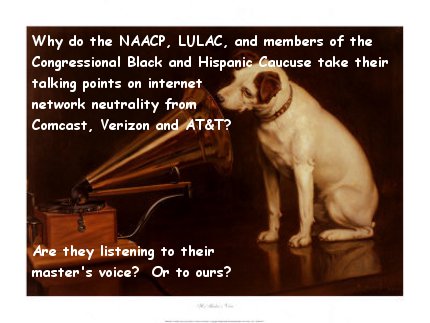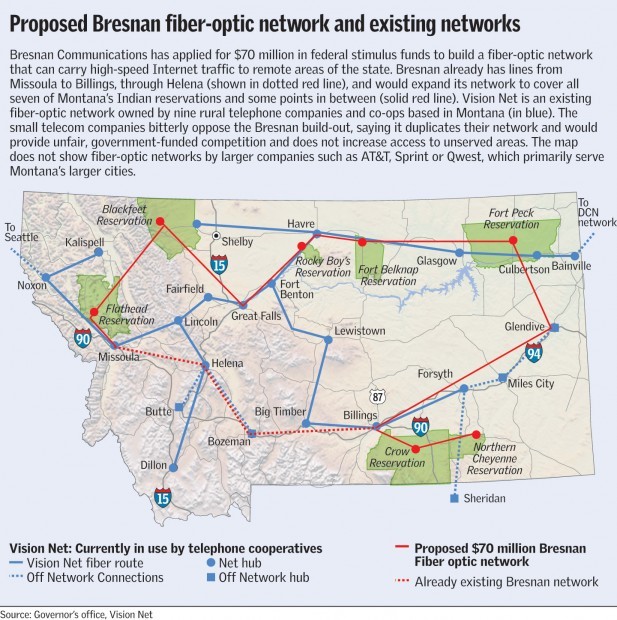In Maine, bankrupt FairPoint Communications managed to scrape up enough cash to launch a lobbying effort to get a bill introduced, tailor-written to prohibit stimulus award winners from… helping provide improved broadband service to Maine residents.
Incredibly, Sen. Lisa Marrache, D-Waterville, the assistant Senate majority leader, has introduced a bill that would ban the system from using any tuition money to help pay for efforts to expand broadband access. Marrache mouthed FairPoint’s talking points as she suggested poor college students’ tuition money would be diverted for broadband projects. She claimed the bill was introduced because constituents FairPoint’s lobbyists and employees were calling her about it.
The fact Marrache so misunderstood a public-private partnership between the University of Maine, Great Works Internet, and two private investors to improve the Internet “backbone” in Maine should be of grave concern to her constituents. Unless some campaign contributions from FairPoint and its executives make their way to Marrache’s next campaign, voters must be wondering whether the majority leader has a grip on the technology matters before her.
Indeed, the University of Maine explained the “middle mile” improvement program was not going to steal students’ lunch money, but rather dramatically improve broadband capacity for all comers — something FairPoint couldn’t be bothered with while breaking promises to expand broadband service themselves.
Jeff Letourneau, associate director of information technology at UMS, told the Bangor Daily News, “as for tuition subsidizing our broadband efforts, that does not happen and will not happen.”
[flv]http://www.phillipdampier.com/video/WABI Bangor Federal Funding of Maine’s Rural Broadband 12-17-2009.flv[/flv]
WABI-TV in Bangor reported on the announced funding of broadband projects in Maine designed to improve rural broadband service statewide (12-17-2009 — 2 minutes)
Ironically, the network that will be built with the help of the broadband stimulus program will be open to any and all providers, including FairPoint, on a wholesale cost basis. But of course FairPoint would not own and control it, so it’s bad for them, and they’re trying to convince Maine lawmakers it’s bad for Maine residents as well.
But then, FairPoint has had a vendetta of sorts against Great Works Internet for months, trying to overcharge the independent ISP for connectivity it obtained under provisions established in the Communications Act of 1996.
Also running interference for FairPoint is Rep. Stacey Fitts, R-Pittsfield, who serves on the Legislature’s Utilities and Energy Committee. His bill prevents any “undue” competition by UMS with existing broadband providers. In other words, he has written the FairPoint Entrenched Provider of Mediocre Broadband Protection Act. Fitts said he has concerns that the university’s efforts could have unintended consequences on private companies (read that FairPoint) that “already provide access.” It will have directly intended consequences on GWI by further disadvantaging them and potentially sinking their efforts to provide better service in Maine.
“If the university is able to bypass some of the competitive markets, and cherry pick, it could affect the ability to deliver broadband to others,” he said.
Exactly how it affects the ability of FairPoint to deliver what it has failed to demonstrate it is capable of delivering is a question Fitts doesn’t answer.
“I know this will cause a lot of discussion in committee,” he told the newspaper. “But we need to have that discussion.”
Maine Public Radio covered the introduction of Rep. Fitts’ bill, and the debate swirling around it. (3 minutes)
You must remain on this page to hear the clip, or you can download the clip and listen later.
Constituents need to have a discussion with him. Unless he wants to be known as the representative from FairPoint, he might want to get out of the way of a project that has a chance of improving broadband in his state, as opposed to the empty promises from a bankrupt provider. If he wants to tie himself to FairPoint’s record of failure, voters can choose someone else to represent them at the earliest possible opportunity.
Those with a need for high speed broadband have tried, and failed, to obtain better service from FairPoint. As Stop the Cap! has reported in exhaustive detail, FairPoint was preoccupied in delivering third world phone service at the time, finally collapsing on the courthouse steps under the weight of its bankruptcy filing.
Bills like these in Maine are further evidence that Congress needs to act on the federal level to pass the Community Broadband Act, which would overturn these kinds of bought-and-paid-for protectionist bills passed in several states. Communities must have the right to bypass companies in the broadband shortage business.
[flv width=”352″ height=”264″]http://www.phillipdampier.com/video/WLBZ Bangor Broadband Stimulus Will Help Maine Health Care 12-2009.flv[/flv]
WLBZ-TV in Bangor showed what broadband brings to Maine’s health care system and other business. (3 minutes)
[flv]http://www.phillipdampier.com/video/MaineBiz Broadband Special 11-2009.flv[/flv]
MaineBiz Sunday spent nearly an hour going in-depth into broadband challenges in Maine, the problems with FairPoint Communications, the dispute with GWI, and more. Appearing on the show, which originally aired last November: Fletcher Kittredge CEO of GWI, Phil Lindley of the ConnectMaine Authority, Steve Hand of Know Technology and Rep. Cynthia Dill of District 121 in Cape Elizabeth. (36 minutes)
Coming up…


 Subscribe
Subscribe











